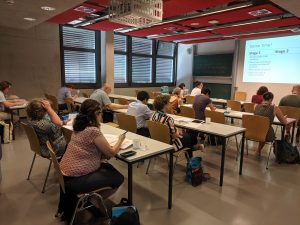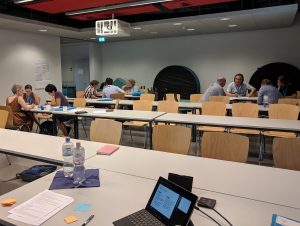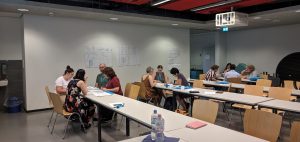A happy update… We won the SoTL Canada Poster Award for this work! Many thanks to the adjudicators at SoTL Canada, as well as to UBC’s Institute for the Scholarship of Teaching and Learning (SoTL Seed Fund), and the UBC Office of the Provost and VP Academic (SoTL Dissemination Fund) for supporting this work.
I’ll be presenting the following poster at the STLHE 2024 conference.
How can a Longstanding Norm-Referenced Grading Policy Impact Teaching and Learning? Leveraging Qualitative Research for Culture Change in a Quantitative Department
Authors: Catherine D. Rawn (Psychology), Martin Dammert (Dept of Human Development, Learning, & Culture), & Jeanie Woo (Cognitive Systems Program)
STLHE 2024 Poster Rawn Dammert Woo (pdf)
Abstract
Grading student work is required at most universities. Literature has promoted criterion-referenced approaches for decades. Recent innovations in ungrading have centred student self-evaluation based on criteria. Yet norm-referenced grading approaches can persist in some departmental microcultures experiencing pressures of large, under-resourced, multi-section courses, and concerns about preventing grade inflation (c.f., Schinske & Tanner, 2014). Efforts promoting equity, inclusion, and Indigeneity create an imperative to question the use of norm-referenced approaches, even under these pressures (Hogan & Sathy, 2022). How do members of a large quantitative psychology department perceive a longstanding norm-referenced grading policy, and its impact on their teaching and learning?
This poster invites viewers to choose any of three ways to engage with this topic: SoTL, Educational Leadership, or professional growth. 1) The first column summarizes a mixed-methods study designed to answer the question above. Qualitative interview data, analyzed collaboratively using Reflexive Thematic Analysis, highlighted positive and negative lived experiences of faculty, graduate Teaching Assistants, and undergraduates in relation to this policy, offering a clear a mandate for reform. 2) The second column outlines the ongoing process of departmental change, as informed by scholarship on departmental teaching cultures (Roxå & Mårtensson, 2015) and Students as Partners (Felten et al., 2019). The goal of this change is to create a policy where, in theory, for every student can succeed—while facilitating high standards, cross-section equity, and support for course instructors under limited resources. 3) The third column highlights the process of personal and professional development experienced by the lead author, including epistemological growth. Aligning with scholarly analysis of SoTL as boundary crossing transformation (Kensington-Miller et al., 2021), engaging in this project changed this quantitative psychologist’s perspective on her own discipline. Viewers are invited to steer our conversation to learn about this grading policy research, department change, and/or growth.
References
Kensington-Miller, B., Webb, A. S., Gansemer-Topf, A., Lewis, H., Luu, J., Maheux-Pelletier, G., & Hofmann, A. K. (2021). Brokering boundary crossings through the SoTL landscape of practice.Teaching & Learning Inquiry, 9(1), 365-380. Retrieved from https://www.proquest.com/scholarly-journals/brokering-boundary-crossings-through-sotl/docview/2538450692/se-2
Roxå, T., & Mårtensson, K. (2015). Microcultures and informal learning: A heuristic guiding analysis of conditions for informal learning in local higher education workplaces. International Journal for Academic Development, 20, 193-205. DOI: 10.1080/1360144X.2015.1029929
Schinske, J., & Tanner, K. (2014). Teaching more by grading less (or differently). CBE—Life Sciences Education, 13, 159-166. DOI: 10.1187/cbe.cbe-14-03-0054
See also
Lok, B., McNaught, C., & Young, K. (2016). Criterion-referenced and norm-referenced assessments: Compatibility and complementarity. Assessment & Evaluation in Higher Education, 41, 450-465. DOI: 10.1080/02602938.2015.1022136
Felten, P., Abbot, S., Kirkwood, J., Long, A., Lubicz-Nawrocka, T., Mercer-Mapstone, L., & Verwoord, R. (2019). Reimagining the place of students in academic development. International Journal for Academic Development, 24, 192-203. DOI: 10.1080/1360144X.2019.1594235
Hogan, K.A., & Sathy, V. (2022). Inclusive Teaching: Strategies for Promoting Equity in the College Classroom. Morgantown: West Virginia University Press.

 Follow
Follow


